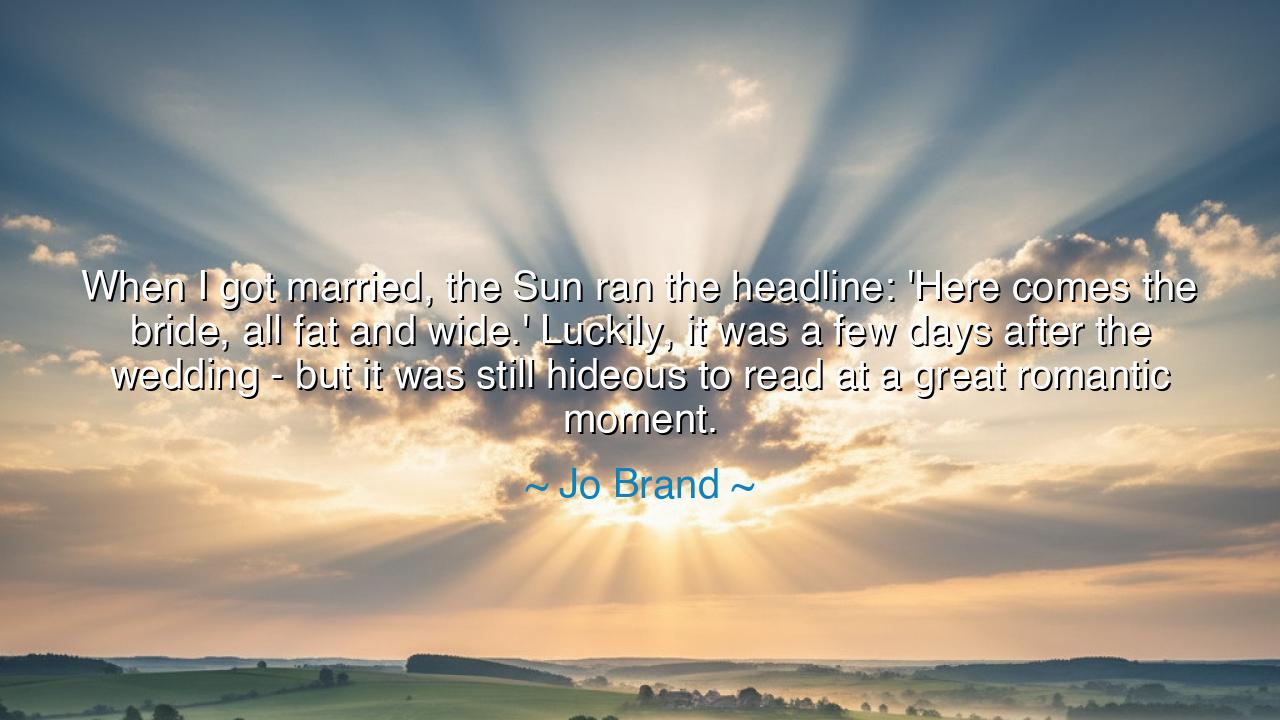
When I got married, the Sun ran the headline: 'Here comes the
When I got married, the Sun ran the headline: 'Here comes the bride, all fat and wide.' Luckily, it was a few days after the wedding - but it was still hideous to read at a great romantic moment.






“When I got married, the Sun ran the headline: ‘Here comes the bride, all fat and wide.’ Luckily, it was a few days after the wedding – but it was still hideous to read at a great romantic moment.” So speaks Jo Brand, recalling not only the cruelty of public judgment but also the fragile beauty of romantic moments that can so easily be scarred by ridicule. In her memory, we see two forces locked in struggle: the joy of love, solemn and sacred, and the pettiness of mockery, cruel and fleeting.
The wedding is one of the oldest and most profound ceremonies of humankind. It is the joining of two lives, the forging of a covenant before witnesses, the weaving of families and futures together. It is meant to be a moment radiant with dignity, a triumph of love’s endurance. Yet here we see how quickly that dignity may be trampled by those who wield words not as truth but as weapons. Even the brightest of days can be darkened by scorn.
The ancients knew well the danger of insult and public shame. In Greece, to mock a bride or groom was to wound not only the person but the sanctity of the union itself. Words had power equal to swords, for they cut reputations, crushed spirits, and left scars invisible but lasting. Jo Brand’s story echoes these truths: that even when the body is not touched, the soul may be deeply pierced by careless cruelty.
Yet her words are not only lament but resilience. Though she names the headline as “hideous,” she survived it, she endured, and her marriage was not undone. This is the heroic note hidden in her tale: that love itself, when true, can withstand the arrows of mockery. Just as the ancient hero must endure taunts from enemies yet march onward to victory, so too does the bride and groom triumph, not by silence of critics, but by the endurance of their bond.
History offers us many examples of this endurance. Consider Abraham Lincoln, mocked for his appearance, ridiculed for his awkwardness, and yet steadfast in his mission. His love for his wife, Mary Todd, was not untouched by storms, yet their union outlasted the scorn of outsiders. The lesson here, as in Brand’s story, is that human greatness is not measured by absence of ridicule, but by the ability to remain steadfast in love and purpose despite it.
The wisdom we may draw is this: do not let romantic moments be defined by the cruelty of others. Beauty does not lie in the words of newspapers or the gaze of critics, but in the truth of two hearts choosing one another. The world may sneer, but love needs no permission to be sacred. Even in the face of insult, love can remain unshaken if those who share it hold fast.
Therefore, beloved listener, carry this teaching into your own life: when you stand at the height of joy, do not yield your happiness to the jeers of others. Guard your moments of love as treasures, untouchable by cruelty. Remember Jo Brand’s tale not as tragedy, but as triumph: the marriage endured, the love remained, and the scorn of strangers faded into dust. For in the end, the world may wound with words, but it is only love that endures through time, radiant and unbroken.






AAdministratorAdministrator
Welcome, honored guests. Please leave a comment, we will respond soon